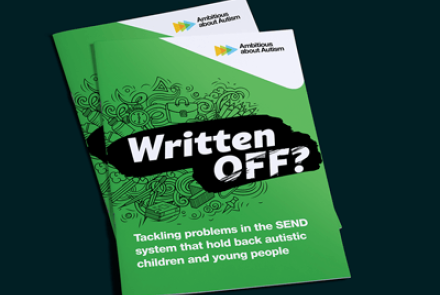Families are reaching crisis point trying to navigate the SEND system
In a climate where local authority funding for special educational needs (SEND) is in crisis and mainstream schools are expected to support increasing numbers of SEND pupils with fewer resources, it is no wonder families commonly battle to get support for their children. In my role as Head of Learner and Family Services, I speak to families every week who are having to fight tooth and nail to get the right support to meet their children’s needs.
Yet more widely, families are being accused of ‘playing the system’ and many in the media and elsewhere declare the system ‘broken’.
Our own research found:
- Over a third (36%) of autistic children were out of education when they wanted to attend school
- Only 35% of autistic young people attending mainstream schools feel listened to when decisions are being made about their support
- 74% of parents said their child’s school place did not fully meet their needs.
Along with many others, we believe the problem is not that SEND rights themselves need to be changed, rather the current law must be more effectively implemented.
The current system under the Children and Families Act 2014 and associated regulations sets out a comprehensive framework of rights. Whilst there is inevitable room for improvement, the real reason the system is ‘broken’ is through chronic underfunding for local authorities and the resulting failure of authorities to follow the law.
This failure is amply evidenced by the fact that last year there was a 25% rise in families going to First Tier Tribunal (SEND Tribunal) and overall 98% won their appeals. Crucially, the judges presiding over these appeals are entirely independent of the local authority and the Department for Education.
At Ambitious about Autism we felt that the Government’s long overdue SEND review published last year was in many respects a missed opportunity to address the failings in the current system, which are leaving so many children and young people missing out on vital support. The severe budgetary constraints in children’s and adult social services are adding further to the pressure and leaving families in a perilous position. I have spoken to many families myself who are under extreme strain. Now we need urgent action to ensure their rights are protected and they get the support they need.
SEN support in schools
As described in the SEND code of practice, SEN support is the first level of support delivered to children who need extra support in mainstream schools to learn successfully, including autistic pupils. We want to see greater consistency in what schools provide and more staff adequately trained to identify and work with children with SEND. However, school budgets are tight, recruitment is challenging and with a national shortage of speech and language therapists, occupational therapists and educational psychologists, it is unsurprising that schools often struggle to provide the support needed.
When a child’s needs cannot be met on SEN support, families can apply for an Education, Health and Care (EHC) needs assessment in the hope of securing an EHC plan. We know the DfE and local authorities have a stated objective of reducing the numbers of needs assessments and plans. However, if schools cannot provide adequate support due to the factors listed above, the underpinning drive for assessment and plans remains. Therefore attempts to limit entitlement to EHC plans will clearly negatively impact the education of children and young people with special educational needs.
Where families are awarded an EHC plan, the law allows them to express a preference for the school of their choice. Currently parental choice can only be dislodged for limited reasons and only where the authority has identified another school which can meet the child or young person’s needs. However, plans being piloted under the SEND review include limiting parents' choice of schools to a tailored list. National banded funding frameworks are also in the pipeline to standardise the cost of different types of provision. Many fear these plans are about saving local authorities time and money rather than the meeting the educational needs of the child.
Long term consequences
Failing to provide the right support to a child or young person with special educational needs has profound consequences. We know many children with SEND suffer from poor mental health. Some do not attend school as they find it such a challenging environment. We also see children under such stress that they exhibit behavioural problems. Children with SEND are statistically more likely to be suspended or excluded which directly correlates to being inadequately supported.
These challenges prevent children and young people with SEND from reaching their full potential which in turn leads to poorer life opportunities. It is a false economy to underfund support for special educational needs at school. It simply leads to children and families being deeply unhappy and reaching crisis point, which then requires higher levels of support in the long term.
What is needed to protect autistic children’s rights?
We want a firm commitment from government that autistic children’s rights will be protected and not watered down in the SEND reforms.
This would give families much needed reassurance, but it must also be backed by proper funding. We need local authorities to be sufficiently resourced to follow the law, so that families receive the support to which they are entitled, and which would enable their children to succeed.
Only then can we ensure that we're not losing generations of autistic children or pushing families into crises.
Through our Written Off? campaign we’re asking the Minister for Children, Families and Wellbeing to commit to upholding children's rights.
About the author
Jo Salsbury is Head of Learner and Family Services at Ambitious about Autism.












